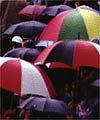| adjective-noun collocations | ||
 |
||||||
|
Amin studying English in New Zealand writes: I usually
get confused using adjectives like heavy, strong, severe, hard.
For example, should it be : |
| Roger replies: | ||
|
As you progress further with your English studies, Amin, you will become more sensitive to which adjectives best collocate with which nouns and which adverbs best collocate with which verbs. You can learn this by listening to as much spoken English as possible and reading as much written English as possible. Always try to learn use of vocabulary from the context in which it appears and with the help of an English-English dictionary which gives plenty of examples of use as well as definitions. In your examples, we would talk about:
heavy / strong / severe / hard might be: |
||||
|
heavy
|
||||
|
strong
I
am strong in the social sciences and psychology is perhaps
my strongest subject. |
||||
|
severe
|
||||
|
hard
|
||||